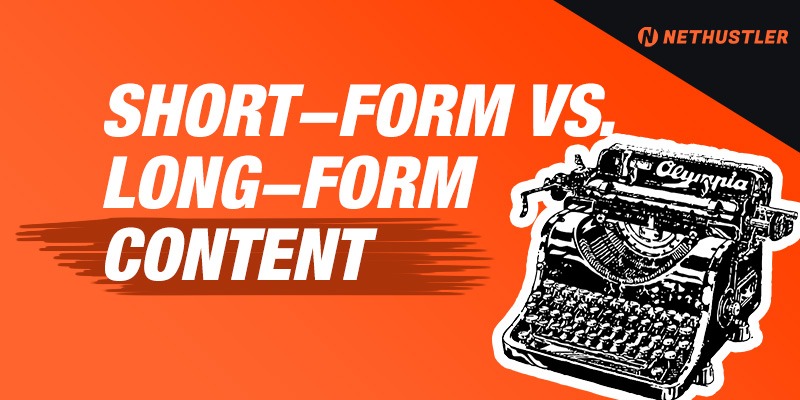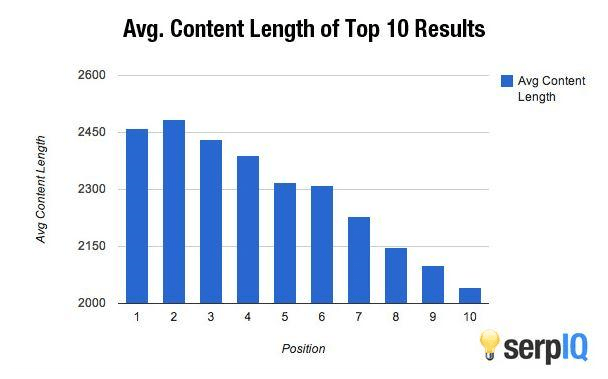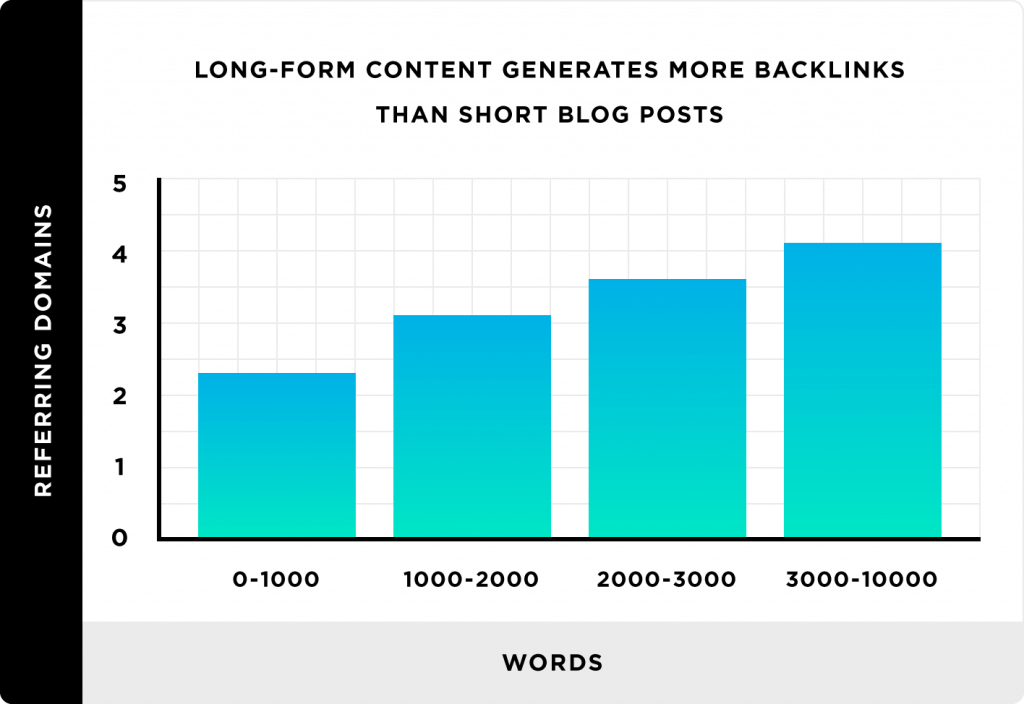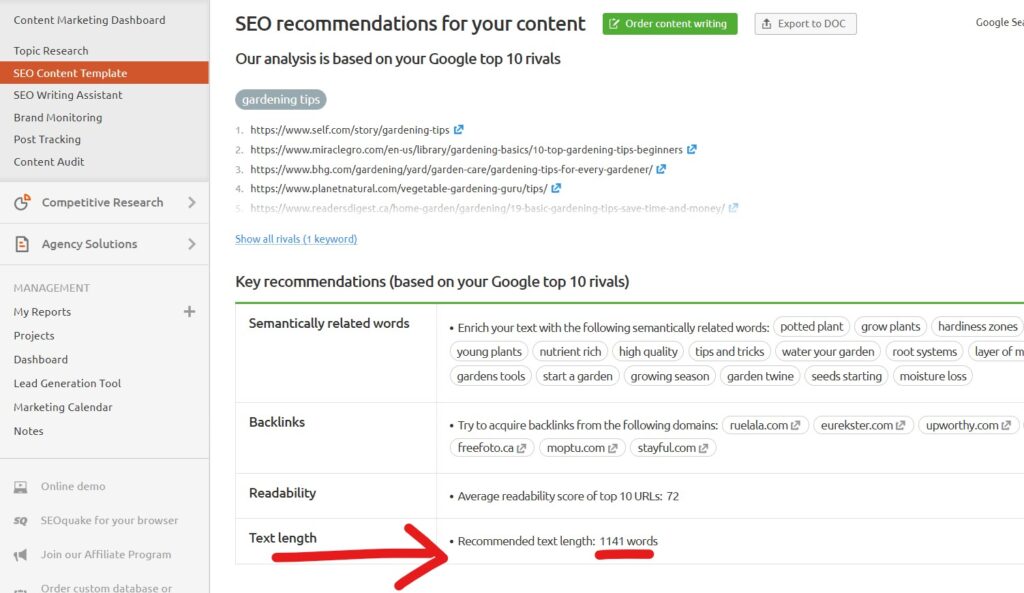Short-Form vs Long-Form Content: What Should You Choose?

Want to start creating awesome content for your site or blog but don’t know what length to aim for? In this article, I will show you the pros and cons of short-form vs long-form content and which one to choose based on your goals.
We all know that content is pretty important these days for building a high authority domain and website and ranking higher in search engines.
What’s more important, is how your copywriting (content) is being used for achieving certain goals that you might have.
So how do you know which type of content to choose for your site? Let’s find out:
Short-Form vs. Long-Form Content
These days it seems that more and more content marketers, SEOs, and copywriters are focusing more on long-form content rather than short-form.
But does this really mean that short-form content is dead and not recommended anymore?
Nope.
Short-form content is still here to stay, at least for the moment. But the applications for short-form content are dwindling, so you need to know when and how to use it.
More on that later tho.
For now, let’s take a look at the differences between short-form vs long-form content.
What is Short-Form Content?
Short-form content is usually referred to articles and blog posts that have less than 1,000 words. Anything over that “becomes” long-form content.
Typically short-form content is best used for:
- Social media posts
- News articles
- PPC Campaigns
- Emails & Newsletters
- Some blog posts
The Benefits of Short-Form Content
These days, you won’t find too many content marketers doing short-form content, but it still has its uses and benefits for example:
Easier to Read
Short-form content is easier to read and consume by your audience. In a world where the attention span of people is getting shorter and shorter, a super slim piece of content that goes straight to the point is preferable by the users.
We all know YouTube videos that are unnecessarily long, going 10 minutes or more. When instead they could have very well been summarized in under 5 minutes or so.
The same happens with blog articles that are lengthier than needed just to “satisfy” Google and other search engines to get better rankings.
Here’s the thing, unless you’re writing a super in-depth piece of content about something, then you should probably cut out all the fluff, and just stick to the main point. You’re going to save a lot of time both for you and for your users.
Mobile Friendly
Short-form content is also very good for mobile users. Think about it, a huge wall of text complete with 10+ images and videos is not a great content consumption experience for mobile.
I know that I almost always avoid long-form content reading when I’m on my phone because if I search for something on my phone, I need a fast solution or answer to something. Am I alone in thinking like this? I highly doubt it.
Plus, if your text size and fonts, and images are not displaying properly on mobile, then that’s going to become a horrible user experience for mobile users.
That’s why short-form content is awesome for mobile consumption. The page will load quicker, the text will be easier and faster to read, and the user will get their answer faster, which is always the most important aspect of content marketing.
User intent plays a big role when it comes to content, and because of that short-form content can still win over long-form.
Faster to Create
Obviously, short-form content is easier and faster to create than long-form content. Not to mention less resource-intensive.
It takes almost nothing to write a 1,000 words article. But try a 3,000+ one and you’re quickly looking at double or triple the working hours.
This can be huge if you’re trying to stay consistent and say write a blog post every day. There are many ways to write blog posts faster, but ultimately it all comes down to the number of words.
The best example of this is Seth Godin, a legendary marketer, and author. His blog posts are read by millions of people every year. His daily blog posts average around 600 words and they get a ton of views and shares.
Sometimes it’s worth going the short-form content route, just for staying consistent and engaging with your audience regularly. Something very hard to do if all you post is long-form content.
This is something that I recently realized when I was thinking about my strategy for NetHustler this year.
I started out writing a blog post daily for about 40 days or so, and let me tell you it was a pain going for 2-3k words daily. That’s why my publishing frequency decreased the past few weeks.
If I’m writing more in-depth articles and guides, I need more time to prepare and get stats and data, versus short-form content that’s much faster to create.
Because of this, I’m going to try and be more consistent by lower the length of my articles just a bit to have enough time to update the blog regularly. Will save the 5,000+ posts only for special occasions 🙂
The Disadvantages of Short-Form Content
Short-form content is not as great as it once was, in fact, it has some pretty big disadvantages such as:
Not Great For SEO
Here’s the thing, if you go type any keyword into Google, chances are that almost all the results on the first page will be long-form content.
In the past, it was very easy to rank even for competitive keywords with content that was as short as 300 to 500 words. Nowadays, that’s almost impossible, especially for hard to rank keywords.
This is because Google nowadays prefers content that’s longer and more in-depth vs shorter content. They think that more words = higher quality. Because of that writers are now churning out an insane number of words and adding a ton of fluff to their content just to “satisfy” Google.
Personally, I don’t agree with that shit. I think that if a piece of content is useful and helpful to users, even if it’s on the shorter side, it should still rank high. But then again I’m not working at Google, so what the heck do I know.
Anyway, long story short (pun intended), if you’re writing short-form content on the regular, chances are your rankings will suffer.
If you want to go after more competitive keywords, you will need to increase your words, at least to match that of your competition.
Not Enough Depth
Depending on the niche and topic of your article, short-form content isn’t always going to cut it. Most of the time, users would want a bit more extra details and information about the things that you write.
That means your users will leave your site unsatisfied and go back to Google searching for another article on the same subject. This gives you a high bounce rate, and low time spent on site, which Google will be quick to notice, and possibly your rankings will suffer as a result.
Less Shares
Short-form content will always get fewer amount of shares on social media vs long-form content.
This will make it harder for your posts to go viral and gain some free organic traffic from social networks.
Conversions Can Suffer
Here’s the thing, some products do great with a shorter description, others require a much lengthier one to convince someone to pull out their credit card.
It all depends on your products and services, and what your competition is doing. Chances are though, that short-form content will lose this battle also, as more and more sales pages are now longer than a dachshund.
So short-form content might in fact hurt your conversion rate. You should do an A/B split test with short-form vs long-form content and see which landing pages gets you more sales.
What is Long-Form Content?
As I’ve said above, although it’s not written in stone, long-form content is usually anything that goes beyond the 1,000 words mark.
For example, a 2,000 words article is essentially long-form content. This type of content is best suited for:
- Infographics
- Pillar content (going in-depth)
- Videos
- Sales pages
- Product descriptions
- eBooks
- Guides & Tutorials
The Benefits of Long-Form Content
It’s a fact that the whole content marketing and SEO industry has shifted towards long-form content, especially in 2022. It seems that every year, the number of words for the content ranking high in Google increases slowly but surely.
So let’s see what’s all the fuss about and why marketers prefer long-form content:
Ranks Higher
If you want to rank high in search engines these days, you will need to pump out those words. A few years ago SerpIQ did a study to find out the average words for the top 10 results in Google. And of course, the answer shouldn’t surprise you.

As you can see, the average content length for the top-ranking pages is 2,000+ words. This clearly shows that Google prefers long-form content over short-form.
So when doing keyword research, if you stumble on some very hard and difficult to rank keywords, make sure to also analyze the competition and the content already ranking for those keywords in the top results.
Chances are that to beat them you will have to outdo them on the number of words your content will have.
Highly Educational
I’ve got to say, I prefer writing long-form content, and not because I want to satisfy Google.
I believe that by giving you a ton of information and going in-depth in all my articles and guides and case studies, you will get the full picture about a subject, which makes it easier for you to learn and understand better the points that I’m trying to make.
Do I like going super in-depth all the time? No, not really, it’s a time-sucking event, writing 5,000+ words articles. Even 3,000 or so is pushing it.
But guess what, my audience (you) and Google love it. Here are the number of words for some of my most popular articles on this blog:
- Cheap Website Traffic – 9,305 words
- How To Start a Blog – 8,884 words
- AdSense Arbitrage – 8,224 words (was over 10,000 at one point)
- Digital Marketing Tools – 7,114 words
That’s why long-form content is good to create if you want to create a better learning experience for your audience.
Most of the time, when people want to learn how to do something properly or fix and solve an issue, they want as many details as possible. A short 600 words blog post won’t cut it for someone that’s trying to learn how to invest in stocks.
Gets More Shares
A few years back, the awesome Noah Kagan of Appsumo.com wrote an interesting guest post for HuffingtonPost, regarding the number of words an article needs to go viral on social media.
Let me save you the trouble of reading the full article:
MORE WORDS = MORE SHARES = EASIER TO GO VIRAL
Easy right?
Apparently the longer the content, the more share it gets on social media platforms such as Facebook, Twitter, and Pinterest.
Content pieces that had anywhere between 3,000 to 10,000 words had on average 8,850 shares.
But also what’s more fascinating is that they found out that short-form content (1,000 words or less), was written 16 times more than long-form content.
This simply means that people don’t want or don’t have the time to create super in-depth posts, and because of that, the ones that do go the extra mile will get more shares.
So if you want higher chances of going viral on social media and getting some sweet free organic traffic, aim to write 3,000+ words.
Earns More Backlinks
Want to build your domain authority higher and faster?
Get more backlinks.
Should you go ahead and spam the web with your links on thousands of forums and blogs? No. Should you use automated software to do it for you? Negative. Should you buy backlinks? No way.
What you should do instead?
Write longer content of course.
A study done by Backlinko on millions of websites found out that long-form content earns 77% more backlinks than short-form.

Again we see that 3,000-10,000 words content is doing fairly well compared to the rest, same as with the social media shares.
So if you hate building backlinks and writing guest posts, then the easiest way of increasing the chances of earning backlinks the natural and organic way is to simply write lengthier articles.
Converts Better
Do you know why most sales pages on the internet are super long?
Because they convert better.
Copywriters get paid tens of thousands of dollars to write long-form sale copies with the single goal of attracting more customers. And it works.
Somehow it doesn’t matter what product or service a company is selling, it’s almost always a long landing page or 40+ minutes video trying to convince people why their product is the greatest and why they should buy it.
That’s because soft-selling is almost always better than hard-selling. And to soft-sell something, you need to do a lot of persuading, on the internet that translates into more words.
Read more: Soft-selling vs Hard-Selling
More words = more information about the product = more conversions.
Pretty much all customers want to make the best decision when buying something and sometimes deciding between two or more products comes down to having more information about a specific product than others.
Now you know why those products from affiliate networks such as Clickbank are so long. Because the vendors have more chances of getting a sale if they keep on explaining to users how “great” their stuff is. Sometimes it’s pure bullshit, but hey, it works.
If you have a product or service that you’re selling and is also a bit on the expensive side, consider opting for a long-form copy, and see if that improves your conversions and sales.
The Disadvantages of Long-Form Content
It’s not all milk and honey with long-form content though. Sure it gets more shares and ranks better in search engines, but there are also some drawbacks:
It’s Time Consuming
It will take you three times more to write a 3,000 article than a 1,000 one.
Sometimes even more, if you count in the time you spend on doing research, gathering relevant stats, data, and finding or creating all the images that you’re going to use.
Not only that but if you outsource your content writing from sites like Fiverr for example, (yes, an affiliate link, boo-hoo), you will have to pay a lot more.
It’s also not great if you want to post consistently, for example, every day. Unless you’re a superhero, and writing is all that you do, you’re going to have a hard time.
Not Great for Mobile
As I said earlier, long-form content is not that great for mobile users. It slows down the site quite a lot, (website speed plays a huge role now in rankings), and it might also be hard to read or be viewed by your audience.
Reading a 5,000+ article on a tiny 6″ display is not really ideal, especially when some people would probably need a fast solution or answer.
I’m curious, let me know in the comments if you enjoy reading long pieces on your phone. I hate it.
Does the Length of Your Content Matter?
As you can see, yes. As with everything in life, size does matter (joking of course). But when it comes to content marketing, sadly it does.
It all depends on your goals though, and what you’re trying to achieve.
If you want to rank higher, get more shares, earn more backlinks, and increase your conversion rate, you should write long-form content.
On the other hand, if you want to be more consistent, don’t have too much time, want to engage and interact with your audience regularly, go for the short-form content.
How To Choose Between Long-Form and Short-Form Content?
Before you can begin to choose between short-form vs long-form content, you should start doing some research.
More importantly, you should research:
1. What others are doing
You want and need to constantly spy on your competition and those that are ranking high in Google for your target keywords.
This way you get to learn a couple of things about what kind of content you should create.
If the top 10 results in Google are pages that have a low amount of words, then you should also go for short-form content because it seems that’s what users want and Google realizes that.
You will also get to learn how to structure your content better, what keywords to insert, images, and a lot more.
If you use Semrush, and I highly suggest that you do, not only because I’m an affiliate but because I truly believe it’s an awesome tool, you can get access to features such as the SEO Content Template:

As you can see, I used the keyword “gardening tips” to see what information Semrush gets from the top 10 results in Google, also known as my “rivals” or “competition”.
The results are pretty interesting, it seems that the recommended text for an article about “gardening tips” is 1141 words.
That’s borderline short-form content territory. I was expecting a much higher number to be honest, but it seems that user intent dictates that people prefer shorter content for this particular keyword.
So yeah, always research what your competition is doing before you decide between short-form vs long-form content.
2. What are you trying to accomplish
As I said earlier, depending on your marketing strategy and goals, you will have to create different types of content.
Most of the time, you will have to do both short-form content and long-form content.
You should use long-form content for your pillar articles (the most important and in-depth ones), and also for your sales pages.
But then you must go with short-form content to engage with your audience easier and faster on social media or provide those with a short attention span a quicker solution to their problems.
So you will always have to do a mix of both if you want to be successful in your goals.
3. User intent & target audience
Find out why and how users have landed on your pages, by monitoring and analyzing your traffic data with tools such as Google Analytics.
This is an important part of the process because you want to match the content on your page exactly with the intent of your users.
So if they have searched for something on Google, you better deliver content that’s related to that. And like the example from above, sometimes the users want to read a shorter article, so that’s what you’re going to make.
Should All Blog Posts Be Just Short-Form or Long-Form?
Nope. I mean, you can choose one or another. With Seth Godin’s blogging style, he only does short-form content most of the time, and Brian Dean from Backlinko goes super in-depth and creates mostly long-form content.
But I believe a mix between the two is the best, and it’s something that I’m going to try out from now on for this blog as well.
Certain posts should be short and to the point, and long-time readers of your blog or loyal customers of your brand that are familiar with you will be pleased to get shorter updates constantly rather than to wait forever before you publish a long-format post.
Likewise, if you’re trying to establish authority on a subject, or attract a bunch of backlinks then you should invest a lot of time into creating pillar or cornerstone content.
This is usually long-form, and really the sky is the limit, in terms of word count, but try for a minimum of 2,000-3,000 words.
Short-Form vs Long-Form Content: Conclusion
As you probably realized by now, choosing between short-form vs long-form content is not an easy process.
But it seems that long-form content tends to dominate many key areas, such as SEO rankings, backlinks, and social shares. But then again short-form content also has some uses even in 2022, particularly for social media and emails.
So in conclusion, use them both. It depends on what you’re trying to accomplish. If you’re going for difficult to rank keywords, almost always you will have to go with long-form.
If you want to stay consistent and write daily and engage with your audience, go with short-form content with a lengthier one now and then.
Me personally?
I fucking hate how we’re all obligated to write long and boring content for just about every topic because that’s what Google prefers to rank.
I find it idiotic and a waste of everyone’s time and resources. But it seems we’ve all accepted our faith, and we’re going along with it until the minimum word count to rank in Google is going to be 10,000 words or some shit like that.
More words don’t always mean more value or more information. This is going in the same direction as YouTube went with their creators and monetization. Where almost every YouTuber is now “forced” to add a few minutes of fluff just to hit the coveted 10 minutes mark, to get better ad revenue.
It’s stupid and viewers know what’s up, that’s why most don’t even bother watching all the videos until the end.
What do you think about all of this? Let me know down in the comments.
Stay hustlin’
Stephen





What Should You Choose?
These days, long form… but people have short attention span also so, it depends on the article / niche. But I usually go for longer posts to try and give more details (if needed) to the reader.
Cheers!
Thanks so much for this article.
Personally, I find it difficult to write long form contents and also annoying to be reading one, especially those that don’t give you your answer straight forward. You will have to read some bunch of words before landing on the answer you are seeking for.
Sometimes when I do write an article of 1500 words, some unnecessary things will be added. However, I like website like how-to-geek, they do go straight to the point and most of their articles, if not all are short form contents, yet they are doing well in Google search engine ranking.
Moreover, we need to play by SEO rules to beat our competitors that is why a few are into writing long form contents and some, writing crappy long form contents.
Thanks for this enlightenment once again and by the way I see this as a review or opinion-based article 😀
Glad you enjoyed the article. Cheers 🙂
SEO is one of the most complex forms of traffic generation in the world, and I like how you simply everything in an understandable way for those who aren’t SEO savvy. I’d take this further and say that deciding to use either short form or long form content also depends on the reason it’s being created. If you have an easier to rank for keyword string, in some cases it can be much more efficient to create a shorter article. But again, the potential for more backlinks and conversions because of having a longer article, might demand for longer content. It’s a mixed bag for sure. Thanks for another great article!
For me it depends more on the niche, if I care about it I’ll usually write the content myself and in that case automatically make it longer. But if I don’t care, I’ll probably outsource it and in most cases it’s going to be shorter than what I would be writing myself.